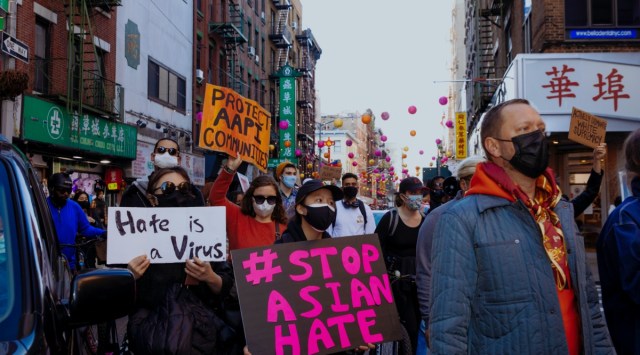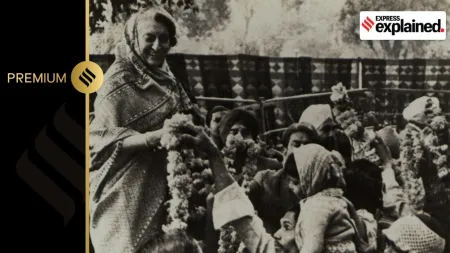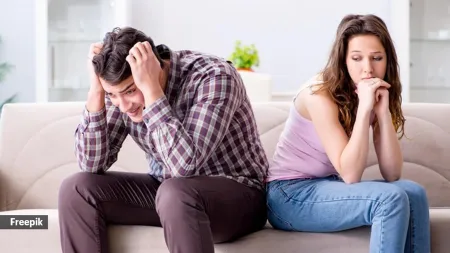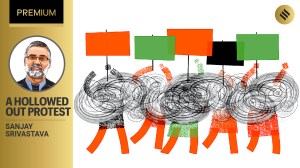- India
- International
‘No vaccine for racism’: Asian New Yorkers still live in fear of attacks
Attacks on Asian Americans have shaken cities around the country: In Los Angeles, hate crimes against Asian Americans more than doubled in the past year, and in Boston, Asian American elders are learning how to defend themselves with canes.
 Demonstrators gather in New York’s Chinatown on March 20, 2021, to protest attacks on people of Asian descent. (Justin J. Wee/The New York Times)
Demonstrators gather in New York’s Chinatown on March 20, 2021, to protest attacks on people of Asian descent. (Justin J. Wee/The New York Times)Written by Ali Watkins and Jonah E. Bromwich
The surveillance video captures a brutal scene: A woman is thrown down a flight of stairs and smacks into the subway platform violently enough to fracture a bone in her face. It was May 28, and the woman, in her 60s, was among dozens of people attacked during a spate of anti-Asian violence this year.
It may not even have been the first such attack by the suspect, John Chappell, a law enforcement official said. Two months earlier, Chappell, who had dozens of prior arrests, had been suspected of lighting an Asian woman’s backpack on fire, the official said. He was released just days after his arrest in May.
Six months into a series of brutal attacks on people of Asian descent across the city, Chappell’s case underscores the challenges police and prosecutors have faced in both preventing the violence and punishing those responsible.
Many of the attacks are unpredictable and carried out by people in the throes of mental health episodes, seemingly at random. Officials say they doubt many of the hate crime charges related to the attacks will stick in court, and those arrested are often released quickly. And the Police Department appears to have scaled back its efforts to stop them: An undercover unit intended to prevent anti-Asian attacks has not been active since May after officers faced threats of violence themselves.

But the attacks have continued, and anxiety and trauma still grip many pockets of the city’s Asian communities, where the violence feels fresh even as the spotlight on it has dimmed.
“There’s still this fear that permeates throughout the community,” said Chung Seto, a community leader and political strategist in Chinatown.
For many, she said, the fear feels like a continuation of the darkest days of 2020, when city residents were afraid of going outside because of the coronavirus.
Now, shop owners in Seto’s neighborhood remain concerned about staying open late, and elders — including Seto’s parents — will not venture outside.
“It’s not so much catching COVID,” Seto said. “There’s no vaccine for racism.”
Attacks on Asian Americans have shaken cities around the country: In Los Angeles, hate crimes against Asian Americans more than doubled in the past year, and in Boston, Asian American elders are learning how to defend themselves with canes. For New York, the problem endures as the city forges ahead with its reopening and visitors once again wander the streets of Chinatown — and many living in the neighborhood say they feel left behind.
But for New York’s police, stopping the attacks before they happen is particularly difficult — even when the person accused has dozens of prior arrests. And even when arrests are made, the defendants are often released pending trial, corrections records show. Chappell, for example, was released just a few days after his arrest, despite prosecutors seeking high bail.
“It’s nice to know there’s a task force. It’s nice to go on the bus, and there’s this messaging of anti-Asian hate crimes,” said Kevin Nadal, a professor at John Jay College of Criminal Justice. “But what does that actually do?”
The challenges continue even as anti-Asian violence keeps rising: As of June 27, reported hate crimes against Asian New Yorkers had increased by 400% compared with the same time frame in 2020, from 21 to 105, according to Police Department statistics. The psychological effects of that violence has scarred entire communities.
Law enforcement officials and experts note that it can be difficult to prosecute cases as hate crimes, which require proving the defendant’s intent was based on the victim’s race or ethnicity. In previous years, many suspects might have been arrested on assault or harassment charges, without a hate crime designation.
“The public is seeing this rash of attacks on Asian Americans, and it is possible that there is a trend happening because of racial animus,” said Alissa Heydari, a former assistant district attorney in New York City who now helps direct the Institute for Innovation in Prosecution at John Jay College of Criminal Justice. “But to prove it in court, when the criminal standard is beyond a reasonable doubt, it is really hard to show that a victim was picked in large part because of their ethnicity or gender.”
The attacks, many of which have been recorded on video and shared widely, shocked the conscience of the city. Groups of volunteers now patrol the streets of Chinatown, hoping to deter potential attacks. Many Asian New Yorkers say they no longer leave home without pepper spray, or established buddy systems.
In March, the Police Department cobbled together a volunteer group of Asian American officers who work during their time off hoping to stop attacks if they see them happening — including a pilot program where undercover officers wandered streets where anti-Asian violence had taken place and was thought to likely reoccur.
The plainclothes officers were meant to both lure potential offenders into confrontation, and intervene if they saw anti-Asian harassment occurring. But the undercover strategy left officers in tenuous positions, and some were nearly attacked, according to a law enforcement official familiar with the matter.
Must Read
May 11: Latest News
- 01
- 02
- 03
- 04
- 05




































